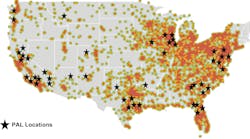As part of a wide range of initiatives to reduce engine emissions from trucks and buses, late in December the EPA mandated a reduction in the sulfur content of highway diesel fuel from 500 ppm to 15 ppm by 2006.
The low-sulfur fuel requirement is critical to the EPA's effort to put in place more stringent diesel engine emissions standards by 2007, aimed at reducing particulate matter (PM) by 90% and significantly lowering nitrogen oxide (NOx) as well.
EPA said its action will reduce 2.6-million tons of smog-causing NOx each year once the program is fully implemented. Emissions of soot, or particulate matter, will be reduced by nearly 110,000 tons each year. The agency estimated that the cost of this program would raise the price of new trucks by $1,200 to $1,900 per vehicle, with the low-sulfur requirement boosting the price of diesel fuel by 4-5¢/gal.
Several industry groups have serious qualms about the low-sulfur diesel requirement, which applies only to the on-road diesel fuel market. “Refiners cannot begin taking action to reduce on-road diesel sulfur until the sulfur limit for the other part of the diesel market — off-road — is known,” said Red Cavaney, president of the American Petroleum Institute.
Cavaney added that the same kinds of pollution-reduction benefits could have been achieved by lowering the sulfur content by 90%, not 97%. Pushing the sulfur level of diesel down to 15 ppm could also cause supply problems, he said.
There is also concern about whether the engine technology necessary to handle low-sulfur fuel and meet the EPA's 2007 emission mandates will be ready in time.
“The American Trucking Assns. is concerned that EPA's rule is based on aftertreatment technology and controls that do not have extensive track records,” said Walter B. McCormick Jr., president and CEO of the lobbying group.
Diesel engine experts share this view. “The EPA's setting of future diesel engine standards and requiring cleaner diesel fuel is unprecedented, both in the levels of reductions in emissions required and the technical challenges and uncertainty in meeting these new standards,” said Allen Schaeffer, executive director of the Diesel Technology Forum.
Schaeffer added, “The future of diesel technology is cleaner fuels, lower emitting engines and exhaust treatment systems. But getting there means significant challenges for all parties — fuel suppliers, engine manufacturers, and the makers of emissions treatment and filtration technologies.” —


